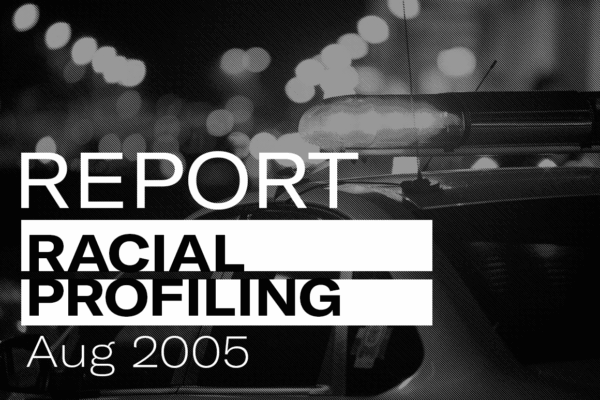In a 15-page report released today, the ACLU of Rhode Island said that a review of the latest statistics on police department traffic stops in the state shows an increase in searches of racial minorities even as white drivers are more likely to be found with contraband when searches are conducted. The statistics cover January through March 2005, the second quarter of a year-long study mandated by state law. That collection of data follows up a similar, comprehensive study of traffic stop data for 2001-2002.
The ACLU issued an earlier report in May that examined data for the first quarter of this latest study, covering October-November 2004. The major findings contained in today’s report generally echo those of the earlier report, as well as the 2001-2002 study: minority drivers remained more than twice as likely as whites to be searched by police, but white drivers were still more likely than racial minorities to be found with contraband when searched. In several respects, however, the ACLU said its latest analysis showed backsliding by a number of departments since the first quarter’s analysis.
Among the major findings contained in the ACLU’s report: The percentage of minorities searched, both in absolute numbers and in comparison to white drivers, was greater in the second quarter than in the first quarter of this latest study.
- Despite this, searches of white drivers were even more likely than in the first quarter to turn up contraband compared to the searches of minority drivers.
- Of the 21 police departments that conducted sixty or more searches during the six-month period of the study, 19 searched minorities at higher rates than they did whites.
- Eleven of those 21 departments have a higher racial disparity in searches for the first six months of this study than they had for 2001-2002.
- During the second quarter of the study, the statewide discretionary search rate for all stopped drivers increased approximately 13% (from 3.4% of all drivers stopped in the first quarter to 3.9% in the second quarter).
Despite an increase in the percentage of discretionary searches conducted during the second quarter, searches were less productive than ever – only 21.9% revealed contraband, down from 27.1% in the previous quarter.
The number of police departments with 3% or higher error rates in its usable search data on the traffic stop cards increased during the second quarter.
In short, minority drivers remain the disproportionate targets of discretionary searches of police, despite the fact that minority searches are even less likely to reveal contraband than are searches of white drivers (which are themselves unproductive.) “While this trend has been evident since 2001, when the collection of traffic stops data was initiated,” states the report, “the large and growing body of data now available makes it both more apparent and less dismissible.”
The ACLU reiterated the need for implementation of a series of detailed recommendations contained in its May report. The ACLU emphasized one in particular: to require all police departments to prepare reports on a monthly basis confirming that the traffic stop cards have been reviewed for disparities, and indicating whether that review has found any patterns relating to officers, locations, or practices that may be responsible for the disparity. “This type of review is,” according to the report, “the only sure way to get to the bottom of any disparity issues. Unless and until that occurs, these disproportionate figures are almost inevitably bound to persist.”
RI ACLU executive director Steven Brown said today: “The statistics for this latest quarter are very discouraging. While, individually, some police departments are showing improvement in their practices, the data as a whole show that racial disparities across the state have increased since the first three months of this latest study. It is more critical than ever that police departments take concrete steps to address the issue – by, among other things, carefully reviewing the traffic stop cards themselves and by requiring officers to document the grounds for any searches conducted.”

